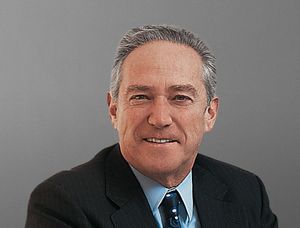Rainer Gut
(banker, deep state operative) | |
|---|---|
 | |
| Born | 24. September 1932 |
| Nationality | Swiss |
| Children | Alexander Gut |
| Spouse | Josephine Lorenz |
| Member of | Credit Suisse, Rive-Reine-Conference |
Swiss banker regarded as heading a generation of managers who controlled the levers of Swiss economic power for 30 years at the end of the 20th century. | |
Rainer E. Gut is a Swiss banker regarded as heading a generation of managers who controlled the levers of Swiss economic power for 30 years at the end of the 20th century, exploiting a far-from-transparent network of financial and political connections.[1]. He was active in organizing the elite Rive-Reine-Conferences.
Biography
Rainer E. Gut was born in 1932 as the son of bank director Emil and Rosa Gut. He attended schools in Zug, London, Paris and Zurich.
In 1968 he became general partner at Lazard Frères & Co., New York and in 1971 president and CEO of the Swiss American Corporation in New York, then a US investment company of the then SKA (Schweizerische Kreditanstalt, now Credit Suisse) in the investment banking area. In 1973 he became a member of the executive board and from 1977 he was spokesman for the SKA, where he became president in 1982.
From 1983 to 2000 he was Chairman of the Board of Directors of SKA and Credit Suisse and between 1986 and 2000 also Chairman of the Board of Directors of Credit Suisse Group (formerly CS Holding - renamed January 1, 1997). From 2000 to 2005 he was President of the Board of Directors of Nestlé AG. He held several board mandates with international groups, including Alusuisse, Bayer, Swiss Re, Swissair, Daimler Chrysler Switzerland, Ciba Geigy / Novartis, Elektrowatt, Sulzer AG. Gut has been Honorary President of Credit Suisse Group since 2000.
His fortune was estimated at CHF 125 million in 2019.
Financial Speculation
Under Guts' performance, SKA developed into a leading international financial services group (CSG) with a focus on investment banking, wealth management and insurance. The banks assumed an increasingly pivotal role in the national economy, accumulating wealth and absorbing job losses in the industrial sector.
"Gut was one of the managers who did most to elevate Swiss banks and other companies to top positions in the world economy," claims Erik Nolmans, a journalist with the financial monthly Bilanz and co-author of a book devoted entirely to the great banker.[2]
For several decades, the Swiss banking industry powered ahead and managed to attract 30 per cent of the offshore assets deposited worldwide ( maybe $300 billion).
In many cases, seats on the boards of these companies had been handed out not on the basis of professional competence, but as a result of string-pulling and the lobbying power of the new members.
The string-puller-in-chief was in many cases Rainer Gut, jokingly known as the "head of Swiss human resources".
Then, towards the end of the 1990s, financial speculation gathered pace and share prices rocketed The doyens of Switzerland's major banks and insurance companies abandoned their traditional prudence and embarked on high-risk strategies and takeovers. Paying over the odds, Credit Suisse acquired the Winterthur insurance company (for SFr15 billion) and a number of investment companies, such as Donaldson Lufkin & Jenrette (for SFr20 billion).
In 2002 and 2003, Switzerland's major banks and insurance companies - including CS - presented their worst ever financial statements, due partly to the crisis triggered by the events of September 11, but also to the financial black holes they had dug for themselves in the 1990s.
Settlement
In the 1990s Holocaust debate on dormant assets, he was involved in the creation of a fund by Swiss corporations. Largely thanks to Gut, there was a settlement between the Swiss banks and the plaintiffs in New York in 1998,costing the Swiss banks a$1.25 billion, but prevented their exclusion from the all-important American market.[3]